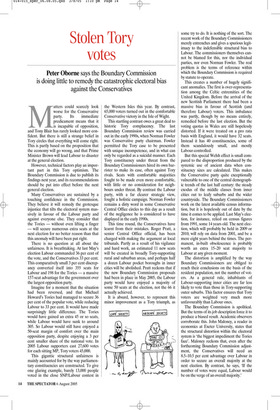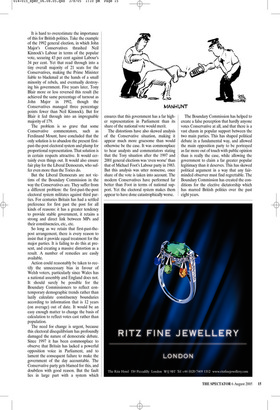Stolen Tory votes
Peter Oborne says the Boundary Commission is doing little to remedy the catastrophic electoral bias against the Conservatives Matters could scarcely look worse for the Conservative party. Its immediate predicament means that it is incapable of opposition, and Tony Blair has rarely looked more confident. But there is still a strange belief in Tory circles that everything will come right. This is partly based on the proposition that the economy will go wrong, and that Prime Minister Brown will lead Labour to disaster at the general election.
However, technical factors play an important part in this Tory optimism. The Boundary Commission is due to publish its findings next year, and its recommendations should be put into effect before the next general election.
Many Conservatives are sustained by a touching confidence in the Commission. They believe it will remedy the grotesque injustice that tilts the electoral system massively in favour of the Labour party and against everyone else. They consider that the Tories — without even lifting a finger — will secure numerous extra seats at the next election for no better reason than that this anomaly will have been put right.
There is no question at all about the unfairness. It is breathtaking. At last May’s election Labour commanded 36 per cent of the vote, and the Conservatives 33 per cent. This comparatively small 3 per cent discrepancy converted itself into 355 seats for Labour and 198 for the Tories — a massive 157-seat advantage for the government over the largest opposition party.
Imagine for a moment that the situation had been reversed, and that Michael Howard’s Tories had managed to secure 36 per cent of the popular vote, while reducing Labour to 33 per cent. It would have made surprisingly little difference. The Tories would have gained an extra 45 or so seats, while Labour would have sunk to around 305. So Labour would still have enjoyed a 50-seat margin of comfort over the main opposition party, despite enjoying a 3 per cent smaller share of the national vote. In 2005 Labour supporters cast 27,600 votes for each sitting MP, Tory voters 45,000.
This gigantic structural unfairness is mainly accounted for by the way parliamentary constituencies are constructed. To give one glaring example, barely 13,000 people voted in the close SNP/Labour contest in the Western Isles this year. By contrast, 65,000 voters turned out in the comfortable Conservative victory in the Isle of Wight.
This startling contrast owes a great deal to historic Tory complacency. The last Boundary Commission review was carried out in the early 1990s, when Norman Fowler was Conservative party chairman. Fowler permitted the Tory case to be presented with unique incompetence, and in what can only be regarded as a suicidal manner. Each Tory constituency under threat from the Boundary Commissioners hired its own barrister to make its case, often against Tory rivals. Seats with comfortable majorities fought to be made even more comfortable, with little or no consideration for neighbours under threat. By contrast the Labour party, with a far clearer strategic view, fought a holistic campaign. Norman Fowler remains a dirty word in some Conservative Central Office circles to this day as a result of the negligence he is considered to have displayed in the early 1990s.
This time round, the Conservatives have learnt from their mistakes. Roger Pratt, a senior Central Office official, has been charged with making the argument at local tribunals. Partly as a result of his vigilance and hard work, an estimated 11 new seats will be created in broadly Tory-supporting rural and suburban areas, and perhaps half a dozen Labour pocket boroughs in inner cities will be abolished. Pratt reckons that if the new Boundary Commission proposals had been in place in May 2005, the Labour party would have enjoyed a majority of some 50 seats at the election, not the 66 it actually achieved.
It is absurd, however, to represent this minor improvement as a Tory triumph, as some try to do. It is nothing of the sort. The recent work of the Boundary Commissioners merely entrenches and gives a spurious legitimacy to the indefensible structural bias to Labour. The commissioners themselves cannot be blamed for this, nor the individual parties, nor even Norman Fowler. The real problem is the terms of reference within which the Boundary Commission is required by statute to operate.
This creates a number of hugely significant anomalies. The first is over-representation among the Celtic extremities of the United Kingdom. Before the arrival of the new Scottish Parliament there had been a massive bias in favour of Scottish (and therefore Labour) voters. This imbalance was partly, though by no means entirely, remedied before the last election. But the voting quotas in Wales are still hopelessly distorted. If it were treated on a pro rata basis with England, it would have 32 seats. Instead it has 40 constituencies, some of them scandalously small, and mostly Labour-controlled.
But this special Welsh effect is small compared to the disproportion produced by the systemic use of ancient data when constituency sizes are calculated. This makes the Conservative party quite exceptionally vulnerable to one of the central demographic trends of the last half century: the steady exodus of the middle classes from inner cities out to leafy suburbs and the wider countryside. The Boundary Commissioners work on the latest available census information, but it is hopelessly out of date by the time it comes to be applied. Last May’s election, for instance, relied on census figures from 1991, some 14 years old. The next election, which will probably be held in 2009 or 2010, will rely on data from 2001, and be a mere eight years behind the times. The permanent, in-built obsolescence is probably worth an extra 15–20 seat majority to Labour at any given moment.
The distortion is amplified by the way Boundary Commissioners are obliged to reach their conclusions on the basis of the resident population, not the number of voters. As a general rule, inhabitants of Labour-supporting inner cities are far less likely to vote than those in Tory-supporting outer suburbs. This factor ensures that Tory voters are weighted very much more unfavourably than Labour ones.
The Boundary Commission is apolitical. But the terms of its job description force it to produce a biased result. Academic observers corroborate this. John Maloney, a reader in economics at Exeter University, states that the structural distortion within the electoral system is ‘the biggest impediment the Tories face’. Maloney reckons that, even after the forthcoming Boundary Commission adjustment, the Conservatives will need an 8.5–10.5 per cent advantage over Labour in order to secure an overall majority at the next election. By contrast, he says, ‘If the number of votes were equal, Labour would be on the verge of an overall majority.’ It is hard to overestimate the importance of this for British politics. Take the example of the 1992 general election, in which John Major’s Conservatives thrashed Neil Kinnock’s Labour in terms of the popular vote, securing 43 per cent against Labour’s 34 per cent. Yet that read through into a tiny overall majority of 21 seats for the Conservatives, making the Prime Minister liable to blackmail at the hands of a small minority of rebels, and eventually destroying his government. Five years later, Tony Blair more or less reversed this result (he achieved the same percentage of turnout as John Major in 1992, though the Conservatives managed three percentage points fewer than Neil Kinnock). But for Blair it fed through into an impregnable majority of 179.
The problem is so grave that some Conservative commentators, such as Ferdinand Mount, have concluded that the only solution is to abandon the present firstpast-the-post electoral system and plump for proportional representation. That solution is in certain respects attractive. It would certainly even things out. It would also ensure fair play for the Liberal Democrats, who suffer even more than the Tories do.
But the Liberal Democrats are not victims of the Boundary Commission in the way the Conservatives are. They suffer from a different problem: the first-past-the-post electoral system militates against third parties. For centuries Britain has had a settled preference for first past the post for all kinds of reasons: it has a greater tendency to provide stable government, it retains a strong and direct link between MPs and their constituencies, etc., etc.
So long as we retain that first-past-thepost arrangement, there is every reason to insist that it provide equal treatment for the major parties. It is failing to do this at present, and creating a massive distortion as a result. A number of remedies are easily available.
Action could reasonably be taken to rectify the unnecessary bias in favour of Welsh voters, particularly since Wales has a national assembly and England does not. It should surely be possible for the Boundary Commissioners to reflect contemporary demographic trends rather than lazily calculate constituency boundaries according to information that is 12 years (on average) out of date. It would be an easy enough matter to change the basis of calculation to reflect votes cast rather than population.
The need for change is urgent, because this electoral disequilibrium has profoundly damaged the nature of democratic debate. Since 1997 it has been commonplace to observe that Britain has lacked a powerful opposition voice in Parliament, and to lament the consequent failure to make the government of the day accountable. The Conservative party gets blamed for this, and doubtless with good reason. But the fault lies in large part with a system which ensures that this government has a far higher representation in Parliament than its share of the national vote would merit.
The distortions have also skewed analysis of the Conservative situation, making it appear much more gruesome than would otherwise be the case. It was commonplace to hear analysts and commentators stating that the Tory situation after the 1997 and 2001 general elections was ‘even worse’ than that of Michael Foot’s Labour party in 1983. But this analysis was utter nonsense, once share of the vote is taken into account. The modern Conservatives have performed far better than Foot in terms of national support. Yet the electoral system makes them appear to have done catastrophically worse. The Boundary Commission has helped to create a false perception that hardly anyone votes Conservative at all, and that there is a vast chasm in popular support between the two main parties. This has shaped political debate in a fundamental way, and allowed the main opposition party to be portrayed as far more out of touch with public opinion than is really the case, while allowing the government to claim a far greater popular legitimacy than it deserves. This has skewed political argument in a way that any fairminded observer must find regrettable. The Boundary Commission has created the conditions for the elective dictatorship which has marred British politics over the past eight years.












































 Previous page
Previous page